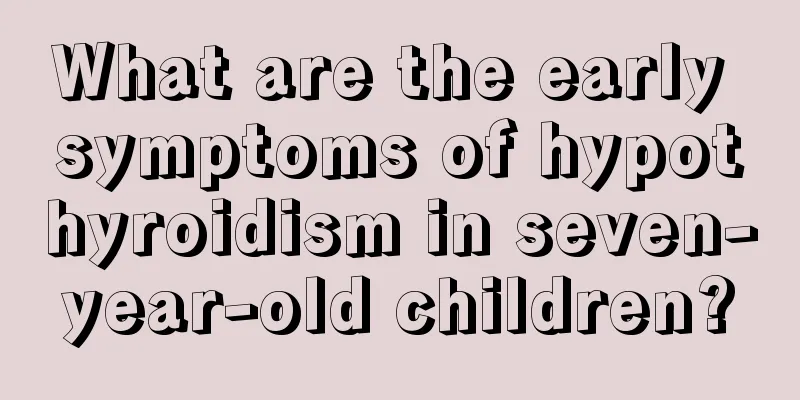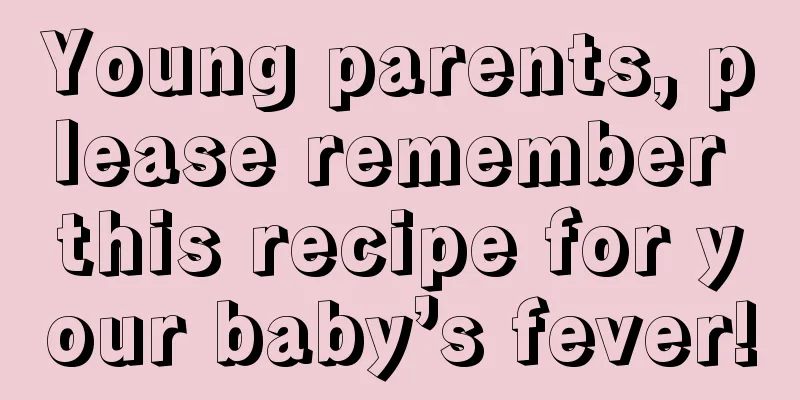Baby's cold clear nasal discharge turns yellow

|
The most distressing thing for a family is when the baby is sick. Since the baby cannot speak, he or she does not know how to express where he or she is uncomfortable and can only cry loudly, which can indeed make parents distressed and worried. However, if it is just a common cold, there is no need to be too nervous. And people often have a runny nose after a cold, but why does the clear nasal discharge turn yellow when the baby has a cold? Has it gotten worse or better? The baby's clear nasal mucus turns into yellow nasal mucus. This is because in the case of bacterial or viral infection, the immune system launches a counterattack, and a large number of white blood cells rush to the infected site to kill the pathogens. After the battle, the remains of the pathogens and white blood cells are discharged into the nasal mucus, appearing yellow or green. If the yellow-green nasal discharge persists for about 10 days and there are no symptoms such as fever or headache, it may be a viral cold. Just keep waiting. It will usually heal on its own in about 10 days. If you have yellow-green nasal discharge accompanied by persistent fever, nausea, and headache, it may be sinusitis caused by bacterial infection and you need to go to the hospital for treatment. The changes of baby's nasal discharge due to cold 【Normal nasal discharge】 Normal nasal mucus is colorless and transparent and will not flow out of the nasal cavity. Its main components are water, as well as protein, carbohydrates and some desquamated cells. Causes of runny nose: Crying: When a baby cries, more mucus will flow out of the nasal cavity. This is because tears flow into the nasal cavity through the nasolacrimal duct and turn into mucus before they are completely absorbed. Cold air stimulation: Parents living in the north should be well aware of this situation. 【Abnormal nasal discharge】 1. Continuous runny nose ① Early stage of cold Clear watery mucus flows continuously from the nose, which is common in the early stages of a cold. This is because after catching a cold, the body wants to flush out the pathogens in the nasal cavity as quickly as possible, causing the nasal mucosa to become congested and swollen, secreting more mucus. Many people want to stop the runny nose as soon as possible when they see their baby has a runny nose. In fact, at this time, you should let the mucus flow out to expel the pathogens. ② Allergic rhinitis If your baby has a constant flow of clear nasal mucus in large amounts, and is also accompanied by symptoms such as sneezing and itchy nose, you should pay attention: Does your baby have allergic rhinitis? When you have allergic rhinitis, you will have a lot of clear nasal discharge, which is actually the body's attempt to expel the allergens in the nasal cavity as quickly as possible. 2. The mucus becomes thicker and whiter After 2 to 3 days of a viral or bacterial cold, respiratory inflammation will cause the mucus to become thicker or whiter. ① Viral cold: The body temperature will improve after the mucus becomes thicker. ② Bacterial cold: After the mucus becomes thicker, the body temperature will not improve. 3. The mucus turns yellow or green In the case of bacterial or viral infection, the immune system launches a counterattack, and a large number of white blood cells rush to the infected site to kill the pathogens. After the battle, the remains of the pathogens and white blood cells are discharged into the nasal mucus, appearing as yellow or green nasal mucus. ① Viral cold: If the yellow-green nasal discharge persists for about 10 days and there are no symptoms such as fever or headache, it may be a viral cold, so just keep waiting. (It will heal on its own in about 10 days) ② Sinusitis: If you have yellow-green nasal discharge accompanied by persistent fever, nausea, and headache, it may be sinusitis caused by bacterial infection. (Need to go to hospital for treatment) How to help your baby blow his nose 1. Do it one by one First, press the nostril on one side to prevent air from entering the nasal cavity; let the baby take a breath and blow out the mucus on the opposite side with a little force; do the same on the other side. 2. Apply a warm towel If your nasal mucus is too thick or a little dry, you can apply a warm towel near your nasal cavity. Water vapor can soften and moisten nasal secretions. 3. Spray sea salt water Another way to soften nasal secretions is to rinse the baby's nasal cavity with bottled normal sea salt water to dilute the viscous secretions. |
<<: What to do if your child has a runny nose
>>: What to do if your three and a half year old baby is constipated
Recommend
How to care for a child's anal redness and pain
Taking care of children is a difficult and carefu...
Why is the skin peeling off the fingers of a three-year-old baby?
What's going on with the peeling skin on the ...
Prevention of influenza in children
Autumn and winter are the seasons when influenza ...
What should I do if my child has a stiff neck while sleeping?
Stiff neck is a common problem. It will occur if ...
Treatment options for children with amblyopia
With the increase in the use of electronic produc...
What kind of porridge is good for children in summer?
In the hot summer, the weather is very hot and ch...
Standard measurement method for height and weight of one-year-old baby
After the birth of a child, parents are very worr...
What are the effects of general anesthesia in children?
We all know that when we need to perform some sur...
What are some baby care games?
When taking care of your baby, in addition to kee...
What is the cause of the blister in the middle of the baby's upper lip?
I believe that all parents want their babies to g...
What to do if your child coughs and has a hoarse voice
What should I do if my child coughs and has a hoa...
What harm does tooth decay do to children?
Children love to eat snacks, especially sweets, s...
What to do if your child suddenly complains of a headache
Children are still in the early stages of physica...
How to treat children's hunchback?
Many parents are troubled by their children's...
What are the symptoms of separation anxiety disorder?
Those who have babies at home may have had this e...









